EP 124 WOMEN ON THE RUN (TO OUST INCUMBENTS)

|
Podcast: Play in new window | Download

|
Podcast: Play in new window | Download
 Joseph A. Califano, Jr. has been one of the most trusted and sensible voices in Washington for nearly a half century. Trusted adviser to Presidents and a passionate defender of our system of government, he has seen enough. In his new book, ‘Our Damaged Democracy’, he details where each branch of the federal government has gone astray and how we, as citizens, must fight to get it back in order. He starts by describing the perils of the Imperial Presidency and growth of The White House staff and then sets his sights on the bought and paid for, gerrymandered Congress and the partisan judiciary. You must hear this…and then do something!
Joseph A. Califano, Jr. has been one of the most trusted and sensible voices in Washington for nearly a half century. Trusted adviser to Presidents and a passionate defender of our system of government, he has seen enough. In his new book, ‘Our Damaged Democracy’, he details where each branch of the federal government has gone astray and how we, as citizens, must fight to get it back in order. He starts by describing the perils of the Imperial Presidency and growth of The White House staff and then sets his sights on the bought and paid for, gerrymandered Congress and the partisan judiciary. You must hear this…and then do something!
Podcast: Play in new window | Download
 That provocative title for a book was intentional. It connotes an America not as far from its slave past as many would like to think. Dr. Angela Hattery and Dr. Earl Smith tackle some very difficult issues in our society as to ways that black bodies are regulated from public education to the criminal justice system. Are we closer to the heralded post racial society than we are to systemic racism that has been a part of the American story for centuries? Join us for a discussion of where we stand on the continuum of social change.
That provocative title for a book was intentional. It connotes an America not as far from its slave past as many would like to think. Dr. Angela Hattery and Dr. Earl Smith tackle some very difficult issues in our society as to ways that black bodies are regulated from public education to the criminal justice system. Are we closer to the heralded post racial society than we are to systemic racism that has been a part of the American story for centuries? Join us for a discussion of where we stand on the continuum of social change.
Podcast: Play in new window | Download
 There have been a number of highly-publicized accidents on America’s railroads recently. Yet, according to a 2017 data from the Federal Railroad Administration released by the Association of American Railroads, the train accident rate, equipment caused accidents, track caused accidents and derailment rates are all down substantially over a fifteen-year period. So what are we, the passengers, to think? On this episode Dr. Joshua Estrin, a forensic safety specialist, joins us to consider whether our railroad system is imbued with a culture of safety and whether truth may fall outside of the numbers. One thing is for sure there are many players in the railroad industry–some private, some public, not least of all the Congress–which make an assessment of the situation difficult. We examine the case of positive train control and what it holds in store for safety going forward. And ask why it’s taking so long.
There have been a number of highly-publicized accidents on America’s railroads recently. Yet, according to a 2017 data from the Federal Railroad Administration released by the Association of American Railroads, the train accident rate, equipment caused accidents, track caused accidents and derailment rates are all down substantially over a fifteen-year period. So what are we, the passengers, to think? On this episode Dr. Joshua Estrin, a forensic safety specialist, joins us to consider whether our railroad system is imbued with a culture of safety and whether truth may fall outside of the numbers. One thing is for sure there are many players in the railroad industry–some private, some public, not least of all the Congress–which make an assessment of the situation difficult. We examine the case of positive train control and what it holds in store for safety going forward. And ask why it’s taking so long.
Podcast: Play in new window | Download
 Retirement expert, Bob Powell, who you read on The Street and in ‘USA Today’ offers the most up to date advice on financial planning for a comfortable retirement. He focuses on the growing number of Americans retiring with too much debt(and what to do about it)and the trend of working longer as the surest path to financial success in this period. We explore a range of other issues with him about the varying stages of retirement and how to plan for them, current think on reverse mortgages and equity lines of credit, as well as the longevity projections mutual fund companies and planners offer about your funds not running out in retirement. Can they possibly be accurate? Tune in and find out.
Retirement expert, Bob Powell, who you read on The Street and in ‘USA Today’ offers the most up to date advice on financial planning for a comfortable retirement. He focuses on the growing number of Americans retiring with too much debt(and what to do about it)and the trend of working longer as the surest path to financial success in this period. We explore a range of other issues with him about the varying stages of retirement and how to plan for them, current think on reverse mortgages and equity lines of credit, as well as the longevity projections mutual fund companies and planners offer about your funds not running out in retirement. Can they possibly be accurate? Tune in and find out.
CHECK OUT THE STREET WITH BOB POWELL
Podcast: Play in new window | Download
 Moms and dads were always imploring us not to leave the table without finishing everything on our plate. That wasn’t a bad maxim at a time when we hadn’t supersized meals. As food has become cheaper as a part of our required expenses, does that admonition still mean anything? Restaurants often think bigger is better, as meals have become cheaper, and heap on portions that are meant for a Philadelphia Eagles lineman. In this context, two years ago, the U.S. Department of Agriculture announced the ‘first ever national food waste reduction goal, calling for a 50 percent reduction by 2030’. First, perhaps, we should define what food waste is(not as easy as you might imagine) and realistically what the uses are for this recovered food. Hint: it will not get to starving people halfway around the world. Professor Marc Bellemare provides a realistic assessment of the issue. He directs the Center for International Food and Agricultural Policy at the University of Minnesota.
Moms and dads were always imploring us not to leave the table without finishing everything on our plate. That wasn’t a bad maxim at a time when we hadn’t supersized meals. As food has become cheaper as a part of our required expenses, does that admonition still mean anything? Restaurants often think bigger is better, as meals have become cheaper, and heap on portions that are meant for a Philadelphia Eagles lineman. In this context, two years ago, the U.S. Department of Agriculture announced the ‘first ever national food waste reduction goal, calling for a 50 percent reduction by 2030’. First, perhaps, we should define what food waste is(not as easy as you might imagine) and realistically what the uses are for this recovered food. Hint: it will not get to starving people halfway around the world. Professor Marc Bellemare provides a realistic assessment of the issue. He directs the Center for International Food and Agricultural Policy at the University of Minnesota.
CHECK OUT THE WALL STREET JOURNAL STORY
Podcast: Play in new window | Download

|
Podcast: Play in new window | Download
 Perhaps, but given the paucity of data about its value in the workplace as a driver of greater achievement and advancement, the truth is we don’t know. A snapshot of one recent year shows that 760,000 master’s degrees were awarded. So, does this give you a leg up on someone who has only achieved a bachelor’s? Mark Schneider, a visiting scholar at the American Enterprise Institute, says that depends on a range of factors, including where you live, where you attained the master’s and what your area of concentration was. One thing is for certain. Colleges and universities see this degree as a cash cow and we explain why that’s the case. More knowledge is good for its own sake, of course, but before you shell out $40,000 to $80,000 to earn the degree, you might want to listen to this episode.
Perhaps, but given the paucity of data about its value in the workplace as a driver of greater achievement and advancement, the truth is we don’t know. A snapshot of one recent year shows that 760,000 master’s degrees were awarded. So, does this give you a leg up on someone who has only achieved a bachelor’s? Mark Schneider, a visiting scholar at the American Enterprise Institute, says that depends on a range of factors, including where you live, where you attained the master’s and what your area of concentration was. One thing is for certain. Colleges and universities see this degree as a cash cow and we explain why that’s the case. More knowledge is good for its own sake, of course, but before you shell out $40,000 to $80,000 to earn the degree, you might want to listen to this episode.
 |
 |
|
|---|---|---|
| Follow @trendspodcast |
Podcast: Play in new window | Download